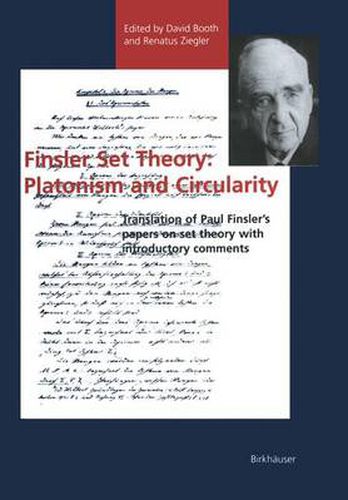Readings Newsletter
Become a Readings Member to make your shopping experience even easier.
Sign in or sign up for free!
You’re not far away from qualifying for FREE standard shipping within Australia
You’ve qualified for FREE standard shipping within Australia
The cart is loading…






This title is printed to order. This book may have been self-published. If so, we cannot guarantee the quality of the content. In the main most books will have gone through the editing process however some may not. We therefore suggest that you be aware of this before ordering this book. If in doubt check either the author or publisher’s details as we are unable to accept any returns unless they are faulty. Please contact us if you have any questions.
Finsler’s papers on set theory are presented, here for the first time in English translation, in three parts, and each is preceded by an introduction to the field written by the editors. In the philosophical part of his work Finsler develops his approach to the paradoxes, his attitude toward formalized theories and his defense of Platonism in mathematics. He insisted on the existence of a conceptual realm within mathematics that transcends formal systems. From the foundational point of view, Finsler’s set theory contains a strengthened criterion for set identity and a coinductive specification of the universe of sets. The notion of the class of circle free sets introduced by Finsler is potentially a very fertile one although not very widespread today. Combinatorially, Finsler considers sets as generalized numbers to which one may apply arithmetical techniques. The introduction to this third section of the book extends Finsler’s theory to non-well-founded sets. The present volume makes Finsler’s papers on set theory accessible at long last to a wider group of mathematicians, philosophers and historians of science. A technical background is not necessary to appreciate the satisfying interplay of philosophical and mathematical ideas that characterizes this work.
$9.00 standard shipping within Australia
FREE standard shipping within Australia for orders over $100.00
Express & International shipping calculated at checkout
This title is printed to order. This book may have been self-published. If so, we cannot guarantee the quality of the content. In the main most books will have gone through the editing process however some may not. We therefore suggest that you be aware of this before ordering this book. If in doubt check either the author or publisher’s details as we are unable to accept any returns unless they are faulty. Please contact us if you have any questions.
Finsler’s papers on set theory are presented, here for the first time in English translation, in three parts, and each is preceded by an introduction to the field written by the editors. In the philosophical part of his work Finsler develops his approach to the paradoxes, his attitude toward formalized theories and his defense of Platonism in mathematics. He insisted on the existence of a conceptual realm within mathematics that transcends formal systems. From the foundational point of view, Finsler’s set theory contains a strengthened criterion for set identity and a coinductive specification of the universe of sets. The notion of the class of circle free sets introduced by Finsler is potentially a very fertile one although not very widespread today. Combinatorially, Finsler considers sets as generalized numbers to which one may apply arithmetical techniques. The introduction to this third section of the book extends Finsler’s theory to non-well-founded sets. The present volume makes Finsler’s papers on set theory accessible at long last to a wider group of mathematicians, philosophers and historians of science. A technical background is not necessary to appreciate the satisfying interplay of philosophical and mathematical ideas that characterizes this work.